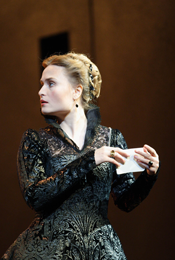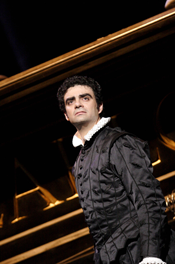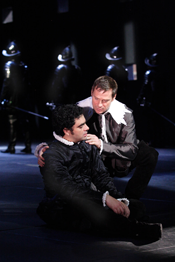23 Jun 2008
Don Carlo at Royal Opera House
In the latter part of last year, the casting for Nicholas Hytner’s new production of Don Carlo — in the five-act Italian version — looked to be on shaky ground.

In the latter part of last year, the casting for Nicholas Hytner’s new production of Don Carlo — in the five-act Italian version — looked to be on shaky ground.
Almost as soon as the 2007/08 season’s details had been published, Angela Gheorghiu decided that the role of Elisabetta di Valois was not for her after all and left Covent Garden’s casting department the challenge of finding a suitable replacement. Soon afterwards Rolando Villazón, the star Mexican tenor destined for the role of Carlo, took a sabbatical on medical advice and cancelled a clutch of international engagements including his planned appearance as Nemorino in the Royal Opera’s L’elisir d’amore.
Anyhow, Villazón returned from his break, the company engaged its former Young Artist Marina Poplavskaya as Elisabetta, the production sold out as soon as it went on sale, and everything appeared to bode well.
 Marina Poplavskaya as Elisabetta
Marina Poplavskaya as Elisabetta
On the evidence of this opening night, Villazón is not yet back to full vocal health. When he is on form, he delivers some thrillingly ardent singing, but elsewhere he is frustratingly inconsistent with cracked notes and intonation problems. The Fontainebleau scene was shoddily sung to the extent that it was tempting to leave at the first interval. And Villazón’s nervy, angsty dramatic interpretation had a tendency to reduce the young prince’s struggles with forbidden love and conflicting political duties to the petty tantrums of a moody adolescent.
 Rolando Villazón as Don Carlo
Rolando Villazón as Don Carlo
Poplavskaya is potentially a great talent (as evidenced by her outstanding Rachel in last season’s concert performance of La Juive) but sadly the role of Elisabetta di Valois is really beyond her, at least for now. The absence of a full Italianate lirico-spinto tone is perhaps not the end of the world, but her obvious vocal fatigue towards the end of the performance presents a serious problem in a role whose major aria takes place in the final scene. The paleness of her pearly, ‘covered’ soprano is matched by an onstage persona that is far too much the ice maiden, even in the opening scene where we should surely be able to see the spark of youth and vitality that has so captivated the impetuously youthful Carlo.
My comments thus far have perhaps made the whole effort sound disastrous. Fortunately this was not the case. As Posa, Simon Keenlyside gave a world-class performance; human, honest and noble. Ferruccio Furlanetto’s brittle Filippo and Eric Halfvarson’s terrifying Grand Inquisitor each exuded such gravitas of presence that their confrontation was truly gripping. The bells and oppressive Catholic glitz of the auto-da-fé scene packed a real punch, with special praise due to the chorus, while conductor Antonio Pappano seems to have the measure of the piece.
 Roland Villazón (Don Carlo) and Simon Keenlyside (Rodrigo)
Roland Villazón (Don Carlo) and Simon Keenlyside (Rodrigo)
Sonia Ganassi’s Eboli was decently-sung in a superficial sort of way, with a big personality and lots of showy fireworks, but her voice and her portrayal seemed to lack an emotional centre. Like Villazón and Poplavskaya, her voice seems a size too small.
The production bears many of Hytner’s hallmarks: uncomplicated situations and character interactions in front of handsome sets in colours evoking the time and place of the setting. The intricate detail used in the individual flats and costumes of Bob Crowley’s designs never takes away from the sense of an elegant visual simplicity. The snow-covered forest of Fontainebleau has a particularly elegant beauty. It is a good-looking, solid staging, and eminently revivable; it seems churlish to complain that it plays things rather safe. Hytner got some boos from the stalls on opening night, which was quite baffling — there were none of the usual triggers which incite audiences to dislike a new production so vehemently.
Ruth Elleson © 2008